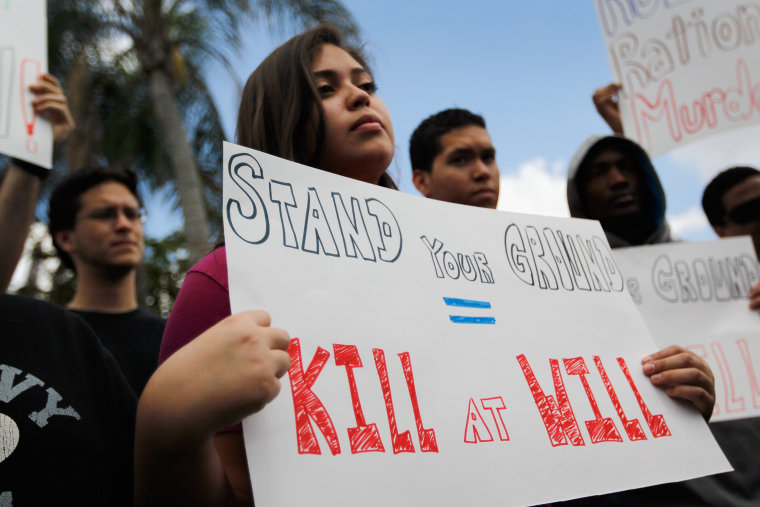Florida Gov. Ron DeSantis wants to amend the state's "stand your ground" law in a proposal that would expand one of the broadest laws of its kind in the country, worrying critics who say it could empower people to use violence during chaotic and tense confrontations at protests.
The move is part of DeSantis' "anti-mob" draft legislation, which would target people accused of illegal acts during riots and looting. DeSantis, a Republican, presented his aggressive agenda in response to the months of large-scale racial justice protests across the country, which at times flared into violent clashes.
"His proposal will only fuel racial unrest and violence, not dampen it," said state Sen. Randolph Bracy, a Democrat whose district includes parts of Orange County. "DeSantis is treating the law as a playbook for his next election, which is reckless and irresponsible."
The draft legislation, which was provided to some lawmakers in late September, was first reported by The Miami Herald and the Tampa Bay Times this week. Florida's self-defense law would be updated to include looting, criminal mischief and arson "that results in the interruption or impairment of a business operation" as justifications for using physical force, including lethal options, against a person.
Looting "means committing burglary within 500 feet of a violent or disorderly assembly," according to the draft legislation, which was shared with NBC News.
Currently, the law permits use of force during the commission of several types of felonies, including murder, robbery, sexual battery and aggravated assault.
In general, Floridians can defend themselves with deadly force if they believe they are in imminent danger or death — and not only when they are inside their homes. The person being threatened is not required to try to flee.
At least two dozen other states do not demand that people retreat from their attackers if they are lawfully allowed to be at a location, such as their private residences, their businesses or public spaces. The potential use of "stand your ground" as a defense drew national attention to cases in Florida, from the fatal shooting of Trayvon Martin, a Black teenager, in 2012 to that of Markeis McGlockton, a Black father of three, who was killed in a convenience store parking lot in 2018.
If prosecutors decide to charge someone who uses deadly force, the person can raise a "stand your ground" defense during a pretrial hearing before a judge. If the person is successful, he or she is granted immunity from prosecution. Immunity is not given to someone who uses force against a police officer in the line of duty.
The law has drawn criticism in cases in which the circumstances surrounding the need for lethal force are in doubt, such as who started the confrontation and who escalated it with violence or the threat of deadly violence.
Kenneth Nunn, a law professor at the University of Florida and assistant director of its Criminal Justice Center, said that explicitly linking "stand your ground" to what happens at demonstrations is "reactionary to extreme."
"Like the 'stand your ground' law generally, it reduces public safety in exchange for a crass political attempt to pit one segment of the population against another," Nunn said. "Our criminal laws should be designed to reduce conflict and, when conflict takes place, to make sure that the least amount of harm is done. This proposal does the opposite."
DeSantis previewed his proposed legislation in September after a wave of national demonstrations that followed the death of George Floyd, a Black man who died in Minneapolis police custody.
"We need to do more in terms of a strong legislative response so we do not always have to play whack-a-mole any time you have situations like this develop," DeSantis said at the time.
"Recently in our country, we have seen attacks on law enforcement, we've seen disorder and tumult in many cities," he added.
DeSantis activated the National Guard in response to some of the earlier protests in Florida, which included multiple arrests and police use of tear gas on protesters. Some state lawmakers are questioning his motive for pursuing his "anti-mob" legislation, saying it echoes much of the "law and order" rhetoric from President Donald Trump.
The proposed legislation would also stiffen criminal penalties for those accused of participating in "violent or disorderly assemblies," making it a third-degree felony to throw an object that hits someone or to block traffic during an unlawful protest. A driver who "unintentionally causes injury or death to a person who obstructs" traffic might also be immune from liability under the proposed law.
The Florida Police Chiefs Association, which represents more than 900 of the state's top law enforcement executives, declined to comment on the proposal. But its president, Satellite Beach Police Chief Jeff Pearson, has previously commended DeSantis for announcing measures that are "urgently needed to protect the lives and property of every Floridian."
"Violent protests endanger lives and threaten the rights of every other citizen we are sworn to protect," Pearson said in September.
While the Legislature remains firmly under Republican control after the election, it's unclear whether DeSantis' draft legislation will find a sponsor for next year's session or advance as written. Neither DeSantis' office nor the offices of Republican leaders in related judiciary and criminal justice committees immediately responded to requests for comment.

David Simmons, a Republican former state lawmaker who helped draft the original "stand your ground" legislation, which was codified in 2005, said he hadn't seen details of DeSantis' proposal, but he said that if it was "properly drafted, this could make good sense."
"If you're a business owner and you're in your business and someone does attack you, you don't have to turn and run. You have the right to stand your ground," Simmons said. "While a lot of people may want to use 'stand your ground' as a defense, the truth is it has limited applicability and must be properly applied."
But in the heat of the moment, especially during a protest, the perception that people may have the right to "stand their ground" with violence will only escalate an already fraught situation, said Caroline Light, a senior lecturer at Harvard University who is the author of "Stand Your Ground: A History of America's Love Affair With Lethal Self-Defense."
She said amending the law could open up scenarios in which armed people would shoot or kill based on the claim that they were protecting a business or private property from "looters" or "mobs" and needed to defend themselves — even if it wasn't their property.
Such a change "would dramatically stretch the boundaries of justifiable violence and homicide in the state while criminalizing certain forms of public protest," Light said.


